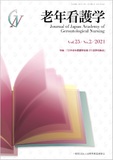Japanese
English
- 販売していません
- Abstract 文献概要
- 参考文献 Reference
抄録
本研究の目的は,85歳以上で腎硬化症により血液透析を導入した超高齢者の現在の生活と心情を,血液透析導入前との対比をもとに明らかにすることである.3人の超高齢者に半構造化面接を行い質的帰納的に分析し,7カテゴリーを得た.超高齢者は,血液透析導入後には健康状態が安定し【心身の安寧により生活を満喫している】生活を得ていた.その生活には,【無理のない自分なりの自己管理をしている】【周囲の人々と支え合いながら役割を果たしている】【有り難く恐縮して公的サポートを受ける】の3つが相互に関連し合い,血液透析導入後に生活の質が向上していた.さらに,【身体の衰えに対処する周囲と自分を残念に思う】【人生の終末期に心揺れつつも希望を抱く】【変わらない自分がいる】という心情があった.これは,生活に変化があっても変わらない自分自身に対する心情であり,超高齢期にあっても自我を発達させていると示唆された.
The purpose of this study was to elucidate the current daily lives and feelings of oldest-old people, those aged ≥85 years old, in whom hemodialysis had been introduced due to nephrosclerosis, compared with before the introduction of hemodialysis. Semi-structured interviews were conducted with three oldest-old people. A qualitative inductive analysis was then conducted and seven categories were obtained. In these oldest-old people, health status was stable after the introduction of hemodialysis and they “Enjoyed their daily lives with mental and physical tranquility.” The three categories of “I manage my life in my own way, without undue pressure,” “I fulfill my roles while giving and receiving support to and from those around me,” and “I accept public assistance with gratitude and humility” were mutually related in their daily lives. The subjects' quality of life improved after the start of hemodialysis. Other feelings included “I feel sorry for the people around me and for myself, as we cope with my physical decline,” “I hold on to hope while feeling uncertain in the final stage of my life,” and “Part of me remains unchanged.” These are feelings people have toward themselves that are unchanged despite the changes in their daily lives, suggesting that they continue to grow even in the stage of very advanced age.
Copyright © 2021, Japan Academy of Gerontological Nursing All rights reserved.


